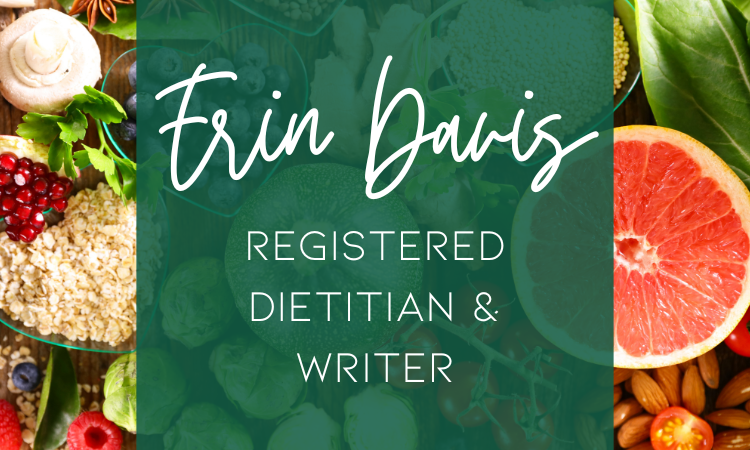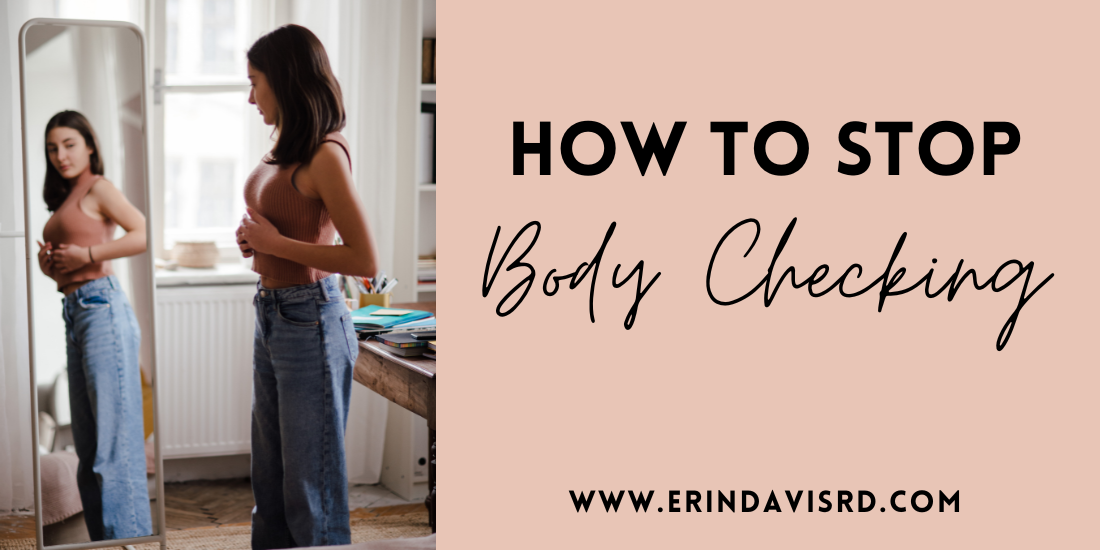Are you frequently looking at your reflection in the mirror? Weighing yourself to evaluate how well your diet is going? Pinching the fat around your belly, hoping it’s decreased? Body checking is a harmful habit that can contribute to our distorted body image. Today, I’m sharing how you can stop body-checking, and start accepting your body.
Have you ever started a diet and obsessively looked for progress on the scale or in the mirror? You aren’t alone. While body checking is more common in those with eating disorders, people who diet also seek validation. After a week of nothing but lean protein and veggies, there has to be a difference in my cellulite, right?
If you’re new to my website, welcome! I’m Erin, a non-diet dietitian and diabetes educator passionate about helping people break free from the burden of dieting and restriction.
In my dieting days, I spent WAY TOO MUCH time scrutinizing myself in the mirror. In this post I will break down what body checking is, why it’s ruining your body image, and how you can stop.
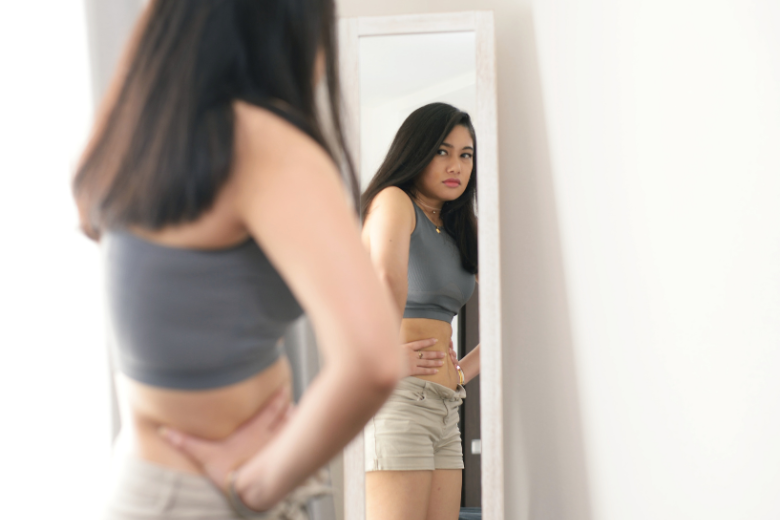
What is body checking?
Glancing in the mirror to make sure your outfit looks good is not body checking. It is perfectly normal to occasionally look in the mirror to ensure we are presentable. However, if you are repeatedly evaluating your body, specifically for body fat or cellulite, it may be body checking. Deeply tied to eating disorders like anorexia, binge eating disorder, and bulimia, body checking is a behavior that may become compulsive.
It’s a habit. You may not even realize you are doing it. Like many habits, we mindlessly perform them day in and day out. Just like chewing your nails or twisting a piece of hair, it becomes second nature. Here’s the thing, biting your fingernails doesn’t give your brain any emotional feedback. Body checking does.
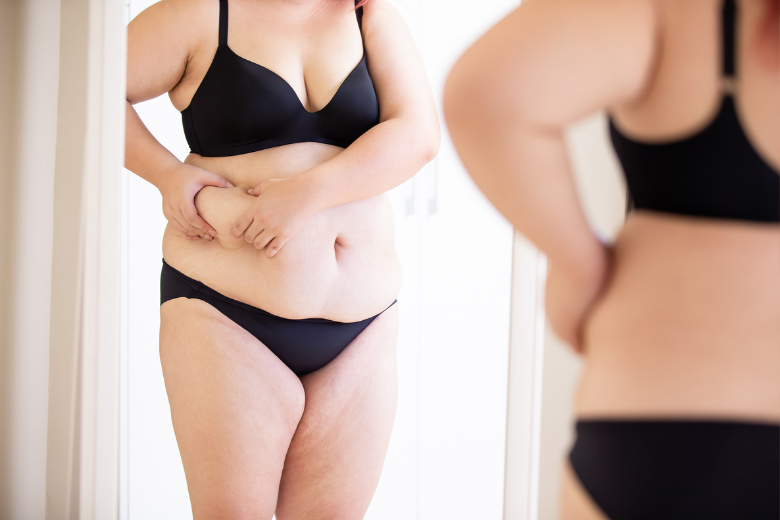
Body checking examples
So how do you know if you are body checking? What exactly is it? Here are some examples of body checking behaviors:
- Looking at your reflection in the mirror: It’s not just a simple glance. Body checking in the mirror is a scrutinizing look—from all angles. Multiple times a day. Sometimes naked or with little clothes on.
- Pinching at the skin/fat on your abdomen, arms, thighs: Whether you are trying to figure out how much you need to lose, or evaluating how well your diet is doing, pinching at your skin or fat is a form of body checking.
- Checking to see if your thighs touch: Constantly wondering if you have a thigh gap? If you stand a certain way, will your thighs touch?
- Feeling how tight/loose something fits: Maybe you have certain clothes that you know should fit that you use as a baseline. Or you put on something that you know was tight to see how it fits now.
- Weigh-ins: If you are obsessively stepping on the scale to see if your weight has changed, it may be considered body checking.
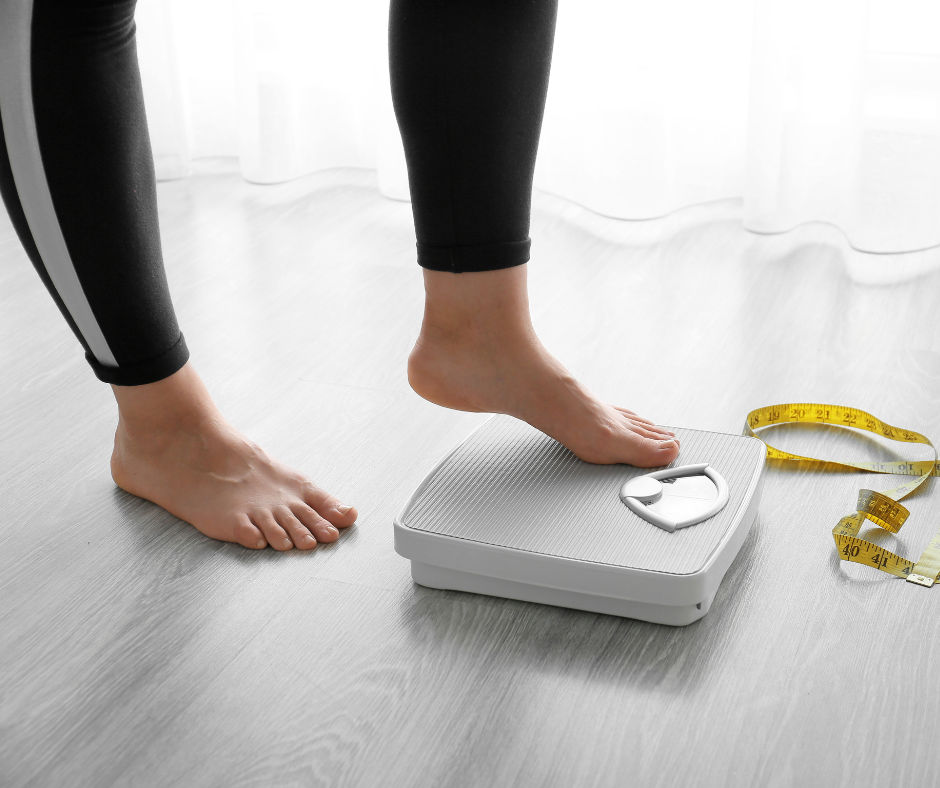
Is body checking bad?
Body checking is associated with body dissatisfaction and eating disorder behaviors. If you are body checking, you are more likely to have a poor self-image, dietary restriction, depression, and lower self-esteem. Bottom line: you are placing too much stock in your body appearance. You are worth much more than that.
I have yet to meet someone who is truly excited about every aspect of their body. We all have things we’d like to change. Maybe you’re okay with your body, but you’d like curly hair instead of straight. Or you’d like less wrinkles or clearer skin, And with our exposure to many “perfect” bodies and faces on social media, it’s hard to not compare.
When we are comparing ourselves with others, we are setting ourselves up for troubled minds. They say comparison is the thief of joy, and I wholeheartedly believe this. We cannot be fully content or joyful if we are constantly striving for better and missing the mark. When we are wanting something we don’t have.
Ironically, when I was youthful and at my fittest, I had the worst body image. It was because I was aiming for an unrealistic expectation. What are your expectations? Body checking doesn’t change your body. It fuels a negative body image.
Not only does body checking mess with your head, but it is also an EXTERNAL cue for eating. Biologically, you are supposed to eat when you are hungry, and stop when you are full. When you body check and find yourself imperfect, you may be tempted to skip out on breakfast, do some fasting, avoid dessert, etc. You may stop eating before you’re full in an effort to save calories. This restriction works against the way your body was designed.
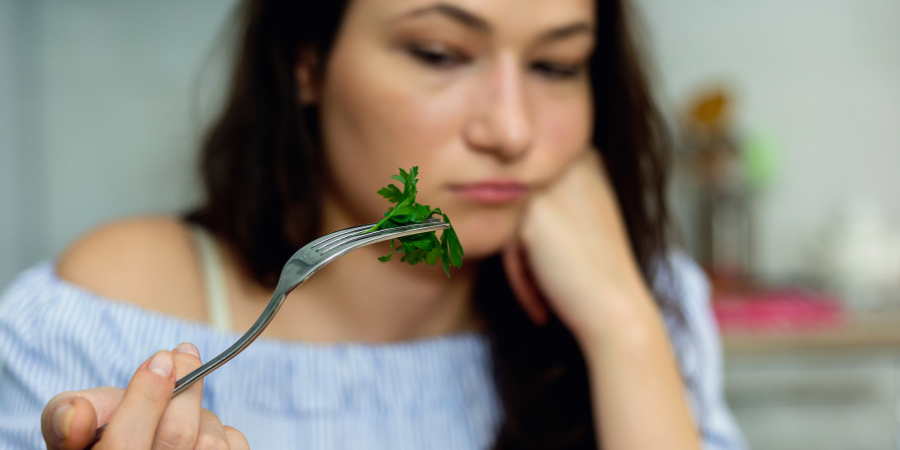
How to stop body checking
This may be easier said than done. You’ve probably been doing it for years! Like any habit training, you’ll need patience. It’s okay to take baby steps to re-route the habit. Here are some tips to stop body checking:
- Take a day or two to track how much you body check—are there triggers, lingering emotions, or changes in eating habits?
- Wait until you are in the shower to take your clothes off.
- Cover up mirrors with a sheet. This is a temporary fix until you drop the habit of focusing on your body.
- Allow yourself to look at certain times, fully clothed. Make sure you put on matching socks and that your shirt isn’t wrinkly, but don’t obsess about rolls or cellulite. DO NOT LOOK AT YOURSELF NAKED.
- Throw out your scale—I promise it’s doing you no good.
- Make sticky notes full of reasons you are thankful for your body and put them on your mirror.
- Journal the feelings you have about your body and diet. Write down the things you say to yourself. Would you say those things to a friend?

Get help
If you are overwhelmed by your body obsession, I am here to help. I want you to know that your worth is not in your body shape or size. There is so much more to you than that. You can find peace and finally accept your body for the amazing creation that it is. Book a free discovery call to meet me. We’ll see if my services align with your needs.
About the author
Erin is a registered dietitian and diabetes educator with almost 20 years of experience. She specializes in weight-inclusive diabetes care and prevention, intuitive eating, fitness, and women’s health. She works as a consultant and writer in the health and wellness space. Erin is passionate about empowering people to manage their own health and to have peace with food.
